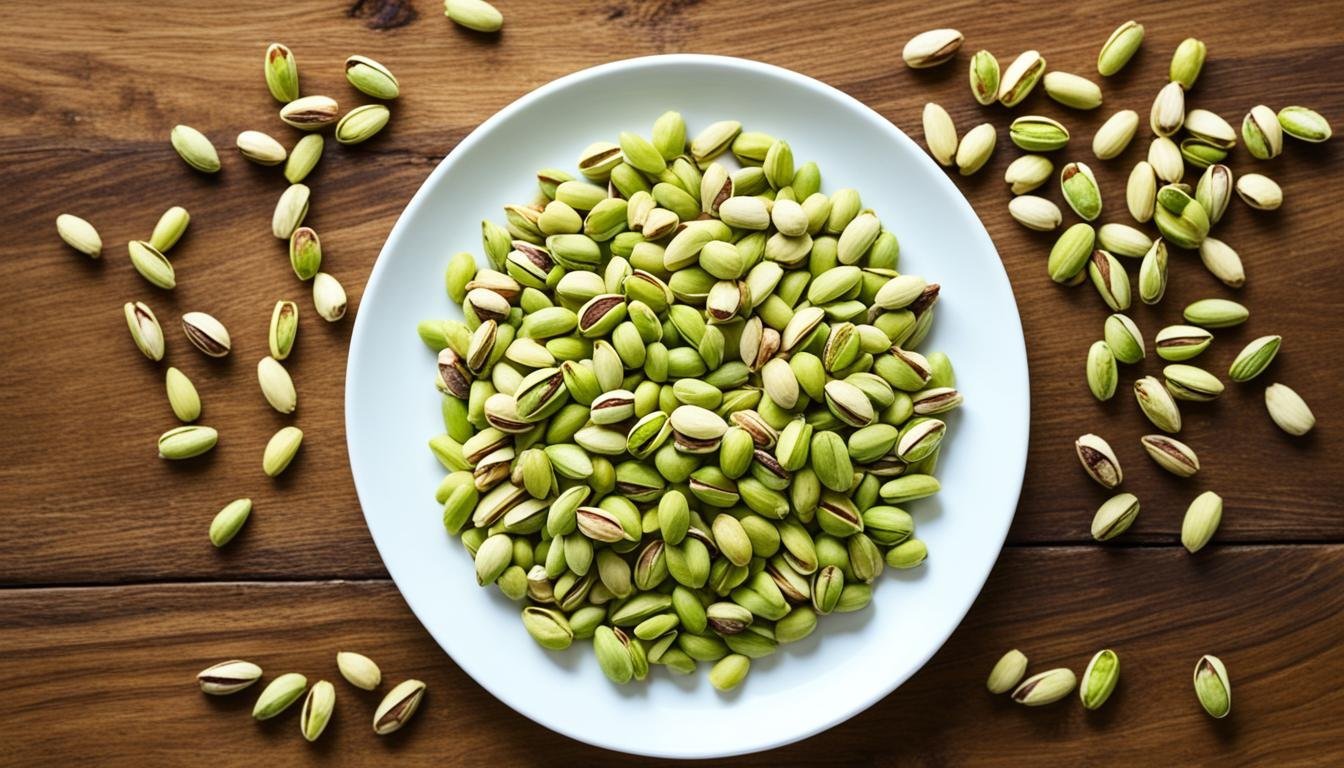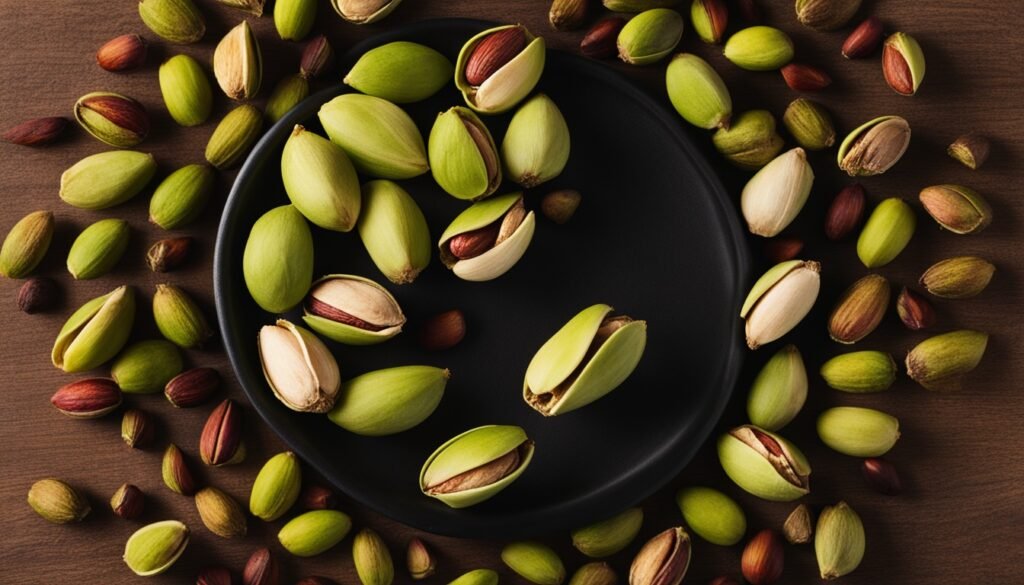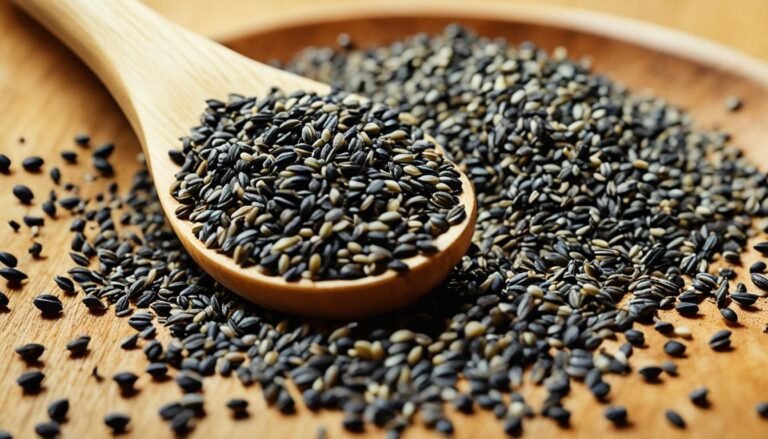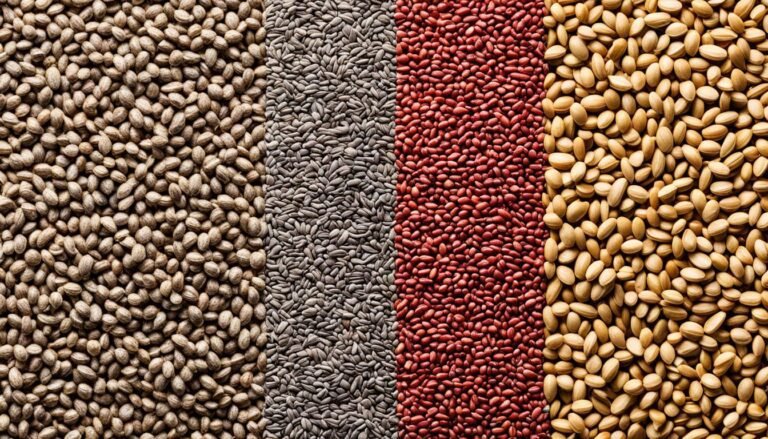Pistachio Benefits for Female Fertility: Boost Chances

Just a handful of pistachio benefits for female fertility and can really enhance your chances of getting pregnant. These nuts are full of important vitamins, minerals, and antioxidants. They are key for supporting women’s reproductive health.
Pistachios have vitamins E and B6, folate, and zinc. These nutrients are vital for fertility. They protect your eggs from damage, help eggs mature, and make ovulation and conception more likely.
Antioxidants in pistachios like lutein, zeaxanthin, and gamma-tocopherol are crucial for egg health. Adding these nuts to your daily diet can boost your fertility. It can also increase your chances of getting pregnant.
Understanding Female Reproductive Health and Nutrition
Proper nutrition is key to keeping female reproductive health strong and boosting fertility. Key nutrients like folic acid, iron, omega-3 fatty acids, vitamin D, and zinc help improve fertility in women.
The Importance of Nutrients in Fertility
These nutrients are vital for the reproductive system. They help with hormone balance, egg growth, and reproductive health. Eating a balanced diet is crucial for the best fertility outcomes.
How Diet Influences the Female Reproductive System
A diet low in fertility-boosting nutrients can cause hormonal issues, irregular periods, and lower fertility. Eating nutrient-rich foods for reproductive health supports fertility and increases conception chances.
Key Vitamins and Minerals for Enhancing Fertility
Vitamins C, E, B12, and folic acid, along with minerals like iron, calcium, zinc, and magnesium, are key for hormone balance, egg growth, and reproductive health. Getting enough key nutrients for female fertility through food can boost fertility.
The Nutritional Profile of Pistachios and Women’s Health
Pistachios are packed with nutrients that boost women’s health and fertility. They are full of high-quality protein, fiber, antioxidants, and many vitamins and minerals. This makes them a superfood for women.
A 100-gram serving of pistachios has 602 calories, 18 grams of protein, 52 grams of fat, and 12 grams of carbs. They are also loaded with minerals like sodium, potassium, calcium, magnesium, phosphorus, and iron. Plus, they have vitamins such as beta-carotene, vitamin E, vitamin C, and folic acid.
These nutrients are key for women’s health. They help with hormone production and reproductive function. They also support overall well-being. For example, pistachios’ antioxidants protect cells from damage, which is good for egg health and ovulation. The fiber helps with digestion, and the vitamins and minerals keep the menstrual cycle regular and hormones balanced.
| Nutrient | Amount per 100g |
|---|---|
| Calories | 602 kcal |
| Protein | 18 g |
| Fat | 52 g |
| Carbohydrates | 12 g |
| Sodium | 5 mg |
| Potassium | 1020 mg |
| Calcium | 135 mg |
| Magnesium | 160 mg |
| Phosphorus | 500 mg |
| Iron | 7.3 mg |
| Beta-carotene | 150 µg |
| Vitamin E | 5.2 mg |
| Vitamin C | 7 mg |
| Folic Acid | 60 µg |
Pistachios have a great nutritional profile. They can greatly benefit women’s health. They support fertility, reproductive function, and overall well-being. Adding pistachios to your diet is a simple way to take care of your health.

Pistachio Benefits for Female Fertility: Improving Egg Quality and Ovulation
Pistachios are great for boosting female fertility. They are full of vitamins, minerals, and antioxidants. These nutrients help with reproductive health, egg quality, and ovulation.
How Pistachios Affect Egg Health and Maturation
Healthy eggs are more likely to be fertilized and implant well. Pistachios have lots of vitamins E and B6, folate, and selenium for reproductive health. Vitamin E protects eggs from damage. Vitamin B6 helps with hormone balance and egg growth.
The Role of Antioxidants in Ovulation and Conception
Antioxidants fight off free radicals that can harm reproductive cells, like eggs. Pistachios are full of antioxidants like lutein, zeaxanthin, and gamma-tocopherol. These protect eggs from oxidation and make them healthier. This can help with ovulation and conception.
Eating pistachios can help improve your egg health and support ovulation. This can increase your chances of getting pregnant.
Highlighting Pistachio Benefits for Female Fertility
Pistachios are packed with nutrients that can boost female reproductive health. They help balance hormones, improve egg quality, and make menstrual cycles regular. They also offer vitamins, minerals, and antioxidants important for fertility.
Pistachios are full of antioxidants like vitamin E and polyphenols. These help with ovulation and conception by fighting cell damage. This keeps reproductive organs healthy, making fertilization more likely.
Pistachios give you vitamins B6 and E, folate, and selenium. These are key for reproductive health. They help with tissue growth, hormone balance, and regular menstrual cycles. All these are important for better fertility.
| Nutrient | Benefits for Female Fertility |
|---|---|
| Vitamin B6 | Supports hormone regulation and red blood cell production |
| Vitamin E | Protects cells from oxidative stress and contributes to egg health |
| Folate | Crucial for fetal development and reducing the risk of birth defects |
| Selenium | Enhances thyroid function and supports reproductive health |
Pistachios are also high in plant-based protein. This is vital for tissue growth and hormone production. The fiber in pistachios helps control blood sugar and supports a healthy weight. Both are key for reproductive health.
Adding pistachios to a healthy diet can boost fertility. They’re tasty and support reproductive health and overall well-being.
Antioxidants in Pistachios Boost Fertility
If you’re trying to conceive, adding more pistachios to your diet might help. These nuts are full of antioxidants that support female fertility.
Pistachios have vitamin E, lutein, zeaxanthin, and gamma-tocopherol. These antioxidants protect reproductive cells from damage. They help improve egg quality and support healthy ovulation, making it easier to conceive.
Studies show pistachios are very rich in antioxidants. They are as good as blueberries, pomegranates, and red wine in this area. Adding pistachios to your diet is a great way to boost fertility.

Pistachios also have other nutrients that help reproductive health, like:
- Protein for hormone regulation
- Fiber for a healthy reproductive system
- Healthy fats that can enhance fertility
- Vitamins and minerals like folate, zinc, and selenium
So, if you want to improve your fertility through diet, eat more pistachios. They’re tasty and good for your reproductive health.
Pistachios: A Nutrient-Dense Fertility Superfood
Pistachios are a great choice for boosting female fertility. They are full of vitamins, minerals, and nutrients that help with getting pregnant.
Protein for Hormone Regulation
Pistachios are loaded with plant-based protein. This is key for making hormones. Having enough protein helps with the hormones needed for the menstrual cycle and pregnancy. It keeps the reproductive system healthy.
Fiber for Reproductive Health
Pistachios are also packed with fiber, besides protein. Fiber helps control blood sugar, keeps you full, and supports a healthy weight. These are all key for good reproductive health. Fiber also keeps your digestive system running smoothly, which is vital for your overall health.
Adding pistachios to your meals gives you a fertility boost. It can help you conceive and support a healthy pregnancy.
pistachio benefits for female fertility
Eating pistachios can boost female fertility in many ways. These nuts are full of vitamins, minerals, and antioxidants. They help with reproductive health.
Pistachios support female fertility by balancing hormones, improving egg quality, and making periods regular. They have lots of unsaturated fat. This fat helps make hormones and absorb vitamins important for making babies.
Pistachios are loaded with vitamin K, vitamin B6, copper, and potassium. These nutrients help regulate hormones and keep reproductive health strong. Plus, lutein and zeaxanthin, two antioxidants in pistachios, protect eggs and help ovaries work better.
Studies prove that eating pistachios can make eggs better and boost fertility in women. Adding these nuts to a diet focused on fertility can help support your reproductive health.
| Nutrient | Benefit for Female Fertility |
|---|---|
| Vitamin K | Regulates hormone levels and supports reproductive health |
| Vitamin B6 | Aids in hormone production and supports nervous system function |
| Copper | Helps in the formation of red blood cells and supports overall fertility |
| Potassium | Maintains fluid balance and supports reproductive organ function |
| Lutein and Zeaxanthin | Antioxidants that protect eggs and support ovarian health |

Pistachios for Hormonal Balance and Menstrual Regularity
Women looking to keep their hormones balanced and have regular periods can benefit from eating pistachios. These nuts are full of phytochemicals and healthy fats. These nutrients help keep hormonal levels right, which is key for fertility.
Polycystic ovarian syndrome (PCOS) is a hormonal issue that affects many women. It causes irregular periods, weight gain, and too much body hair. Eating pistachios can help manage these symptoms. They are packed with fiber, protein, and important vitamins and minerals. These nutrients help control blood sugar and boost reproductive health.
Pistachios also help keep your periods regular. They contain phytoestrogens that balance your hormones. This leads to a more predictable and healthy cycle.
| Nutrient | Amount in 28g of Pistachios |
|---|---|
| Fiber | 3g |
| Protein | 6g |
| Potassium | 290mg |
| Zinc | 1.1mg |
| Phosphorus | 139mg |
| Vitamin B6 | 0.4mg |
| Manganese | 0.6mg |
Adding pistachios for hormonal balance and pistachios for menstrual regularity to your daily meals can boost your reproductive health. Start enjoying the perks of this nutritious nut today!

Incorporating Pistachios into a Fertility-Boosting Diet
Pistachios are easy to add to a diet aimed at boosting fertility. By adding them to your daily meals, you can get the nutrients your body needs for reproductive health. This can help increase your chances of getting pregnant.
Here are some ways to include pistachios in your fertility diet:
- Add pistachios to your breakfast cereal or oatmeal for a protein-packed start to the day.
- Sprinkle pistachios in fertility-boosting diet on top of your salads for a crunchy, nutrient-rich topping.
- Enjoy a handful of pistachios as a satisfying snack, providing a boost of essential vitamins and minerals.
- Incorporate pistachios into baked goods, such as muffins or energy bars, for a nutritious treat.
- Use ground pistachios as a breading or coating for lean proteins like chicken or fish.
Pistachios are a versatile and nutritious addition to any fertility-focused diet. By adding them to your meals and snacks, you can enjoy their benefits for female fertility. These include their high levels of antioxidants, healthy fats, and essential vitamins and minerals.
| Nutrient | Amount in 1 ounce of Pistachios | Percentage of Daily Recommended Intake |
|---|---|---|
| Protein | 6g | 12% |
| Fiber | 3g | 11% |
| Vitamin B6 | 0.5mg | 25% |
| Magnesium | 34mg | 8% |
| Potassium | 290mg | 8% |
Other Health Benefits of Pistachios for Women
Pistachios are more than just good for fertility. They also help with heart health, weight, and skin health. These nuts are full of nutrients that are great for women’s health.
A study in the American Journal of Clinical Nutrition showed pistachios help lower LDL cholesterol. Another study in the Hypertension Journal found pistachios can lower blood pressure.
For women trying to manage their weight, pistachios are a good choice. A study in the Journal of Nutrition found pistachios increase antioxidants in the blood. Another study in the Journal of the American College of Nutrition showed pistachios help reduce BMI and waist size.
Pistachios are also good for the skin. They have a lot of Vitamin E, which protects against sun damage and aging. The fatty acids in pistachios keep the skin moisturized and elastic, fighting aging signs.
Looking to boost your fertility, heart health, or skin? Pistachios are a great choice. They’re packed with nutrients that support women’s health in many ways.
Potential Side Effects and Precautions
Pistachios are packed with health benefits, but it’s key to watch out for side effects and take precautions. They are a great food to add to your diet because they’re full of nutrients. But, they are high in calories, so eating them in moderation is important to avoid gaining weight.
One big worry with pistachios is the risk of aflatoxins. These are harmful mold toxins that can grow if the nuts aren’t stored right. Aflatoxins are toxic and can be bad for your health. To avoid this, make sure to buy pistachios from trusted sources and keep them in a cool, dry spot, away from moisture and heat.
Some people might have allergic reactions to pistachios, which can be mild or severe. If you’re allergic to tree nuts, talk to your doctor before eating pistachios.
| Potential Side Effects of Pistachios | Precautions When Eating Pistachios |
|---|---|
| Weight gain due to high calorie content Exposure to harmful aflatoxins from improper storage Allergic reactions in individuals with tree nut allergies Gastrointestinal issues, such as bloating or diarrhea, in some people | Consume pistachios in moderation to avoid weight gain Purchase pistachios from reputable sources and store them properly to prevent mold growth Be mindful of any allergic reactions and consult a healthcare professional if you have a known tree nut allergy Start with small portions and monitor your body’s response to pistachios |
Knowing about these potential side effects and taking steps to avoid them lets you enjoy pistachios safely. Eating them in moderation, storing them right, and being aware of your body’s reactions are important. This way, you can add these nutritious nuts to your diet without any worries.
Conclusion
Pistachios are a superfood that can greatly help with female fertility. They are packed with vitamins, minerals, and antioxidants important for reproductive health. These nutrients can improve egg quality, balance hormones, and regulate the menstrual cycle.
Understanding how pistachios help with fertility lets you make better food choices. Adding pistachios to your diet, along with other healthy habits, can boost your fertility. This can increase your chances of getting pregnant.
If you want to improve your fertility, try eating pistachios. You can snack on them, add them to meals, or find new ways to include them in your diet. Pistachios are tasty and full of nutrients that support fertility, making them a great addition to your health routine.
FAQ
How can pistachios benefit female fertility?
Pistachios are full of vitamins E and B6, folate, antioxidants, and minerals. These nutrients are key for better female fertility. They help improve egg quality, balance hormones, and make conception easier.
What key nutrients in pistachios contribute to reproductive health?
Pistachios are loaded with vitamins E and B6, folate, antioxidants, protein, fiber, and minerals like magnesium and zinc. These help with hormone balance, egg growth, and reproductive health.
How do the antioxidants in pistachios boost fertility?
The antioxidants in pistachios protect reproductive cells from damage. They neutralize free radicals, making eggs healthier and improving conception chances.
Can pistachios help regulate hormonal balance and menstrual cycles?
Yes, pistachios’ phytochemicals and healthy fats help balance hormones, which is key for fertility. They also help keep menstrual cycles regular, which is vital for fertility.
How can I incorporate pistachios into a fertility-boosting diet?
You can add pistachios to salads, breakfast cereals, or just eat them as a snack. Including pistachios daily can give you the nutrients you need for better reproductive health and fertility.
Are there any potential side effects or precautions to be aware of when consuming pistachios?
Pistachios are high in calories, so eat them in moderation to avoid gaining weight. Also, if not stored right, they can get moldy and have harmful toxins. Always check for spoilage before eating them.






